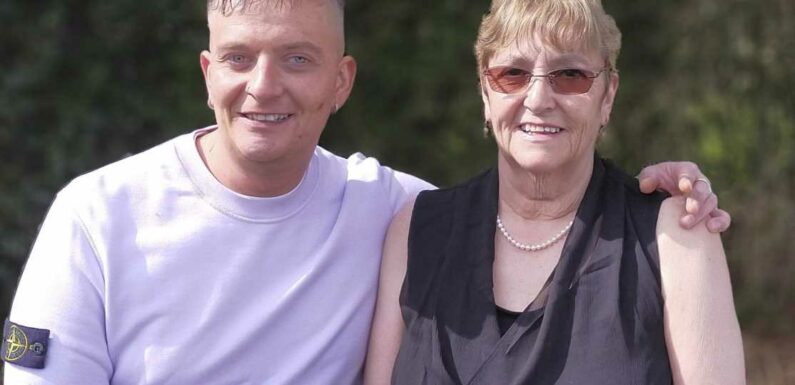
A CARPENTER suffered a life-threatening stroke which left him with sepsis and partially blind, after a splinter in his hand got infected.
Dave Parkyn, from St Austell, Cornwall, got the splinter of wood caught in his hand while working in August 2020.
Unbeknown to him at the time, the little injury would 'devastate' his life and future dreams.
He has since "lost his income, his self-confidence, pride and ambition", according to his mother, Jackie Parkyn. 65.
Dave first visited his GP after coming home from work with a massive headache and feeling really ill.
The doctor misdiagnosed hi, with a possible pulled muscle in his back which the expert believed was causing the headache, Dave said.
Read more on meningitis
I fell into a coma & almost died but woke up with an extraordinary new talent
Urgent warning over spike in meningitis cases – the 9 signs you need to know
Dave, now 30, was told to go home and unfortunately deteriorated through the night.
The next day he was in intensive care in a medically induced coma with machines sustaining all his bodily functions.
The splinter festered and led to bacterial meningitis, which rampaged through his body, causing a severe stroke – leaving him disabled at the age of just 28.
The infection causes inflammation of the membranes that surround and protect the brain and spinal cord.
Most read in Health
My boy was left fighting for his life with deadly Strep A – signs you must know
I'm an addiction specialist – 13 signs you're an alcoholic & how to cut back
Chemists ARE running low on antibiotics for Strep A, as child death toll hits 15
I found my daughter dead – I don’t want other parents to have to face my pain
If it is not treated quickly – like in Dave's case – meningitis can cause life-threatening septicaemia (blood poisoning) and result in permanent damage to the brain or nerves.
In addition to the stroke, Dave was suffering from pneumonia, chest abscesses and sepsis.
His family were advised his life support would be turned off if he showed no signs of improvement later that week.
Luckily Dave's condition improved but he has been left partially blind and with other disabilities affecting an arm and a leg.
His new disabilities mean he will never be able to return to the work he"loved so much", Jackie said.
In the two years since his stroke, Dave and his family have struggled to cope with the emotional implications of the incident.
Dave now speaks to a counsellor about his traumatic experience which he said has helped with the healing process.
The young lad said: "It was just nice to be able to talk to someone and share my feelings and not feel judged.
"We spoke about lots of things. We talked about friendship. I've lost a lot of friends since it happened."
He added: "When I come out after our sessions I feel like a big weight has come off my shoulders."
His mother said she had learned to cope with feelings of "deep guilt" after the accident.
She said: "I cannot move on from the guilt I have but I suppose that's part of being a parent."
Dave shared his story as part of a Stroke Association campaign.
The charity's campaign aims to raise awareness of the mental health impact of the condition and the services available to those who need them.
What are the symptoms of meningitis?
The symptoms of meningitis develop suddenly and include:
- A high fever over 37.5 degrees – the average human temperature
- being sick
- a headache
- a blotchy rash that doesn't fade when a glass is rolled over it
- stiffness, especially in the neck
- sensitivity to bright lights
- drowsiness, irritability or lack of energy
- cold hands and feet
- seizures
In babies, the symptoms can be slightly different.
Read More on The Sun
Full list of postcodes due £25 cold weather payments direct to bank accounts
I’m a teacher, 5 Christmas gifts we’ll actually use & it’s not a mug
They may:
- refuse to eat
- be agitated and not want to be picked up
- have a bulging soft spot in their head
- be floppy and unresponsive
- have an unusual, high-pitched cry
- have a stiff body
Source: Read Full Article








